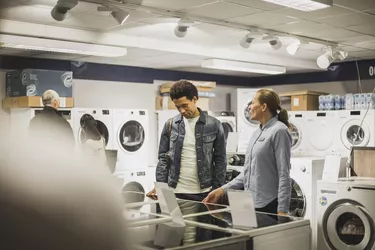
Retailers are ever alert to ways of drawing in new customers and generating more sales. Whether it be for refrigerators, washing machines or new computers, one alluring offer frequently seen is the "90 days same as cash" deal. These can legitimately help you buy a needed appliance without incurring interest or monthly payments. However, be sure you understand what's in the fine print when you're accepting this kind of offer.
90 Days Same as Cash Meaning
Video of the Day
What exactly does the "same as cash" part of this deal mean? In effect, the retailer is willing to provide a short-term loan and, for the term of the "same as cash" period, is prepared to charge no interest and demand no payments. As long as the customer pays for the product within the 90-day time period, the loan will be entirely interest-free. As far as the retailer is concerned, for those 90 days it's the same as if the customer paid cash in a single payment, or "same as cash."
Video of the Day
Considering Retailer Markup
Retailers may be eager to let customers take advantage of these loan offers, even if the customers have a bad credit history. They can be used to stimulate sales in during seasonal lulls, such as the period after Christmas when consumers are reluctant to spend.
Ninety-day purchase terms can also help retailers compete against price-cutting competitors, using the financing to protect their profit margins. If the purchase is paid off on time, the retailer profits from the sale. If it's not, the retailer generates additional revenue from the financing charges.
Looking at Interest Rates
The part often overlooked by unwary consumers is that interest is accumulating throughout the 90 days. It simply isn't charged if – and only if – you meet the payment arrangements laid out in the contract.
If you don't pay off your purchase completely by the end of the 90 days, you'll owe every penny of that interest all the way back to day one. The same usually holds true if you miss a payment, or are late on a payment. Interest rates for these arrangements can easily reach 20 to 25 percent, though they're capped in some states.
Weighing the Pros and Cons
The pros and cons of "90 days same as cash" offers are relatively straightforward. If you're disciplined enough to pay off the total before the end of the 90 days, you won't be penalized. In a pinch, you could even use your regular credit card – with its much lower interest rate – to pay off any outstanding balance. In that case, the purchase genuinely is "the same as cash."
The downside is that if you're unable to meet the payment terms, the interest charged through these offers quickly becomes burdensome.
Seeing a Few Examples
If you're awaiting a lump sum of cash – a tax refund, for example, or the maturation of a CD – a "90 days same as cash" offer can be ideal. You'll have the use of your purchase immediately and can pay it off when you receive the funds. If you have enough money in your bank or enough room on your credit cards to support the purchase, a 90-day offer lets you avoid interest and retain the use of your funds for other purposes.
On the other hand, if your savings are minimal and your income is barely adequate to the purchase, you might be better advised to use a layaway option or simply save up the money.